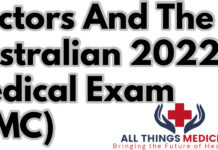Page Contents
Are you a medical student who is anxious and panicking about the upcoming physiology exam? Well, you have come to the right place. This article will enlist the best ways to study for a physiology exam along with some textbook recommendations.
Physiology may seem tedious at first but as soon as you start to grasp all the concepts, it can become really interesting. Learning about how the body and the organ system work, communicate and function is really compelling in my opinion.
What is physiology?
Physiology is the study of the human body’s functions and mechanisms. It is one of the most important subjects because once you are aware of the human body’s normal functions, only then you will be able to understand the pathology and make a diagnosis.
How to study for physiology exam
Stop procrastinating
First and foremost, start preparing early. Do not procrastinate because as they say ‘you snooze you lose’. When you are in med school, you are aware of how much hard work you have to put in to be able to ace your exams. There is a sea of knowledge and a lot to learn so leaving everything for the last 10-20 days before exams is really not a good idea.
Prepare a schedule and stick to it
You should count the chapters and the days left before your physiology exam and then assign a chapter or two for each day. You should cover your syllabus at least 5 days before your exams. The last 4-5 days should be dedicated to practice exams and revision. Do not cram up your schedule and of course that is only possible when you start preparing early.
Figure out your learning style
There are 4 learning styles namely visual, auditory, reading/writing and kinesthetic. They are pretty self explanatory. For me, personally, visual learning has proved to be the most fruitful. If you are also a visual learner, you could watch video lectures. Physiology consists of a lot of charts and pathways so watching videos of these pathways can really help retain all the information.
For an auditory learner, listen to the lectures carefully. If your learning style is reading or writing, then highlight the important points as you read and take notes. Write everything down in your own words.
You can download and watch Kaplan Physiology lecture videos here.
Use mnemonics
Physiology consists of a lot of names and a number of functions of the organs, glands, blood etc. It can be hard to memorize each one of them. What really helps with this are mnemonics. You can either come up with some mnemonics of your own or look them up on the internet. A great example of this would be a mnemonic for the functions of the kidney.
“A WET BED”
- Acid-base balance maintenance
- Water balance maintenance
- Electrolytes balance
- Toxins’ removal
- Blood pressure control
- Erythropoietin production
- Vitamin D metabolism
Build concepts
Physiology is a very conceptual branch of medicine. One of the best ways to study for a physiology exam is to build clear concepts. You can do this by regularly attending lectures at your university and recording them if need be. This way you will be able to listen to the lectures again for a better understanding. After a lecture, you can read the textbook and then write everything down in your own words. This really helps.
Simply memorizing everything without concepts will only get you so far. Sure, it will help you in the short run and you may end up clearing your exam, but it would not be beneficial in the long run. When the amount of knowledge is this vast, it can be very volatile. You may end up forgetting everything you learnt after your exam.
Study with your classmates

Studying in a study group is another great way to study for a physiology exam. This way, you can easily fill up the gaps in your knowledge about the subject. Something that you may have overlooked, someone else in your study group must have studied about it and can fill you in.
Practice, practice, practice
Last but not the least, practice! I can not stress enough about how important it is to solve past papers or practice tests. They provide valuable insight about the type of questions, important topics, the time that you spend on each question etc. The mistakes can also help you figure out the topics that require more of your time.
Revise
Revision is a fundamental step before you finally appear for your exam. It is very important to go over everything that you have studied once again to make sure you recall everything. Revision should not take a lot of your time if you have studied everything thoroughly. Just skim through your notes.
Textbook
Choosing the right textbook for yourself can be overwhelming. You should always pick the book that you understand easily and helps you build up your concepts.
I personally used Guyton and Hall Textbook of Medical Physiology. It has 2 volumes. It is lengthy and can seem redundant but it is great for building concepts. It’s easy to understand as well. It has charts, diagrams and tables. Another good textbook is Ganong’s Review of Medical Physiology. If Guyton does not seem like a good option to you, then try this one. Although my advice would be to pick Guyton.
After listening to the lecture, read the book. Read it over as many times as it takes for you to retain all the information and clearly understand it, one paragraph at a time.
For revision I used Pocket Companion to Guyton and Hall Textbook of Medical Physiology. It is a short book and great for quick revision. It highlights all the important points and refreshes your memory.

Download the PDF of Guyton and Hall Textbook of Medical Physiology
The bottom line
To sum it all up, the best way to study for a physiology exam is to start preparing early, make a time table and stick to it. It is essential that you build concepts rather than just memorizing. Lectures, notes and textbooks are all equally important. Medical exams can be unnerving but fret not, practice all the steps listed above and you will definitely ace your physiology exam.
Recommended articles
Why Dermatology Is Better Than Other Specialties
Monkeypox Outbreak 2022: Symptoms, Treatment, Prevention And More













